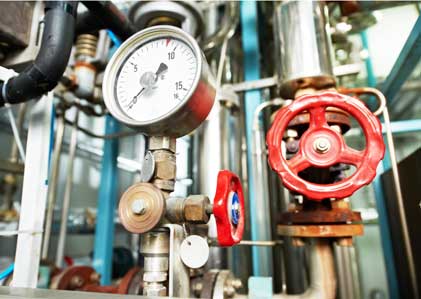Steps to Becoming an AC Technician
As with any career, not everyone pursuing the AC technician career will take the same steps. Following is the most common path toward the job, including a few optional steps that will depend on personal preference and the availability of opportunities such as apprenticeships:
Step 1: Complete high school diploma or GED (four years). There are no strict educational prerequisites to becoming an AC technician in most cases, but the vast majority have earned at least a high school diploma or GED. High school students who are already interested in a career as an AC technician may even take vocational training courses during high school to have a head start upon graduation.
Step 2a: Enroll in a technical training program (two years). The majority of AC technicians also have some type of post-secondary education. Some examples include:
Los Angeles Trade-Tech College
Los Angeles Trade-Tech College (LATTC) offers an associate of science (AS) degree and a certificate of achievement in heating, ventilating, air conditioning (HVAC), and refrigeration preparing students with the necessary skills and knowledge for a career in commercial, industrial, and residential repair and service of air conditioning, refrigeration, and heating systems. Students will also be prepared for certifications such as Environmental Protection Agency (EPA) section 608 and North American Technician Excellence (NATE).
Made up of 50 credits, the certificate includes courses such as refrigeration fundamentals; indoor air quality; principles & practices of electrical circuits & controls; compression systems of refrigeration; and gas heating systems; among others.
The associate degree program comprises 69 credits, including coursework in applied calculations and measurements; pipe and tube joining processes; refrigeration electrical circuits & controls; refrigeration system components; applied refrigeration and air conditioning principles; and air conditioning and refrigeration mechanics.
A program like the LATTC option will prepare AC techs well for an entry-level position. Electrical controls, compressor installation & repair, and piping installation are just some of the skills that graduates would master during this program.
- Location: Los Angeles, CA
- Accreditation: Accrediting Commission for Community and Junior College, Western Association of Schools and Colleges
- Expected Time to Completion: Certificate (less than a year); AS degree (24 months)
- Estimated Tuition: California residents ($46 per unit); non-residents ($289 per unit)
Houston Community College
According to the BLS (May 2021), Houston, Texas has the sixth-highest (7,580) employment for heating, air conditioning, and refrigeration mechanics and installers. Houston Community College is well aware of this market and has created an AC technician program that offers the required skills and knowledge necessary for air conditioner repair and maintenance. Introducing students to new and emerging technologies, these programs allow students to efficiently operate systems.
The college offers one associate of applied science degree and two certificates in HVAC/R for aspiring HVAC workers. The basic certificate is made up of 21 credits, while the advanced certificate comprises 42 credits. The AAS degree consists of 60 credits.
The curriculum includes courses such as electrical calculations; air conditioning control principles; refrigeration principles; residential air conditioning; gas & electric heating; advanced air conditioning controls; commercial air conditioning; and air conditioning troubleshooting to name a few.
All programs prepare students for the section 608 EPA recovery certification. Graduates of these programs will be able to service, maintain, repair, and troubleshoot almost every type of HVAC equipment while also learning about safety and regulations rules surrounding this industry.
- Location: Houston, TX
- Accreditation: Southern Association of Colleges and Schools Commission on Colleges (SACSCOC)
- Expected Time to Completion: AAS (24 months); certificates (12 months each)
- Estimated Tuition: In-district ($107.50 per credit); out-of-district ($203.50 per credit); out-of-state ($322 per credit)
Mount San Antonio Community College
Mount San Antonio offers an AS degree and a air conditioning and refrigeration technology certificate. Both programs combine classroom lectures and hands-on training in the lab preparing students for a high-paying career in HVAC/R. This college is one of the very few in the US, whose HVAC programs have received accreditation from both PAHRA and HVAC Excellence.
Comprising 31.5 credits, the certificate program includes courses such as technical mathematics; AC codes and standards; welding; electrical fundamentals; refrigeration fundamentals; heat load calculations and design; gas heating; commercial systems; and air properties and measurement.
The degree program comprises 61 credits, including all courses from the certificate, including public speaking and freshman composition; art and humanities; science and math; social science; lifelong understanding; and electives.
Graduates can take up positions in areas such as design, operations, manufacturing, sales, installation, distribution, repairs, controls, and maintenance.
- Location: Walnut, CA
- Accreditation: PAHRA; HVAC Excellence; Accrediting Commission for Community and Junior Colleges (ACCJC)
- Expected Time to Completion: Certificate (12 months); degree (24 months)
- Estimated Tuition: In-state ($46 per unit); out-of-state ($334 per unit)
Hennepin Technical College
Hennepin Technical College’s HVAC program offers the following three program options:
- Residential HVAC diploma
- Commercial HVAC/R diploma
- Associate in applied science degree in HVAC/R
The residential diploma comprises 34 credits and includes courses such as sheet metal; electrical circuits; refrigerant transition and recovery; basic refrigeration; gas heat systems; refrigeration certification exam; residential heat pumps; electrical diagrams; and hydronic heat systems, among others.
The commercial diploma is made up of 31 credits and delves into courses such as commercial HVAC/R safety and servicing procedures; packaged heating and cooling equipment; commercial heat pump systems; commercial ice-making machines; pneumatic controls; refrigerated coolers and cases; water chiller machines; and low-pressure steam & water boilers, among others.
The AAS degree consists of 72 credits, including courses such as basic refrigeration; electrical circuits; central air conditioners; psychrometrics; hydronic heat systems; low-pressure steam & water boilers; introductory physics; interpersonal communication; and oil heat systems, among others.
Upon completion, graduates will be ready to work in service, management, maintenance, installation, and refrigeration and HVAC equipment sales. They can take up roles such as quality control technicians, installers, manufacturer’s representatives, service technicians, layout persons, designers, and sales consultants.
- Location: Eden Prairie and Brooklyn Park, MN
- Accreditation: HVAC Excellence; Higher Learning Commission (HLC)
- Expected Time to Completion: Diploma (two semesters each); AAS degree (four semesters)
- Estimated Tuition: $178.06 per credit
Pennsylvania College of Technology
The Pennsylvania College of Technology offers a 131-credit bachelor of science program and a 70-credit associate of applied science degree in HVAC technology.
The curriculum includes courses such as HVAC/R electricity; air conditioning systems; mechanical systems design and operation; basic heating systems; HVAC print reading & automated design; warm-air heating & duct design; hydronic heating systems; residential HVAC system design; and HVAC controls, among others.
Graduates of the BS program will be able to take up roles such as applications engineers, design engineers, sales engineers, project estimators or managers, and commercial service & installation technicians. AAS program graduates will be qualified for positions such as equipment mechanics, sales representatives, air conditioning lab technicians, and industrial physical plant maintenance technicians.
- Location: Williamsport, PA
- Accreditation: PAHRA; Middle States Commission on Higher Education (MSCHE)
- Expected Time to Completion: BS (48 months); AAS (24 months)
- Estimated Tuition: In-state ($598 per credit); out-of-state ($856 per credit)
Step 2b: Apply to an apprenticeship program (two to five years). Many AC technicians choose to go the apprenticeship route, gaining immediate hands-on, paid experience under the supervision of more experienced technicians.
Depending on the sponsoring organization, an apprenticeship can take up to five years to complete, during which apprentices earn a percentage of an experienced technician’s salary. In California, for example, the California Apprenticeship Coordinators Association sponsors a five-year, 8,000-hour apprenticeship program for air conditioning technicians.
While only some states will have the exact same program, most metropolitan areas have similar offices or unions that have apprenticeships for new technicians. The US Department of Labor Apprenticeship Finder has resources.
Step 3: Complete EPA Section 608 Certification. Anyone in the US who works with refrigerants must have the EPA Section 608 certification, which deals with the handling and disposal of these potentially harmful chemicals.
Many technical training programs and apprenticeships will have this certification built into the program, but prospective AC techs must verify this. If certification is not offered as part of their chosen program, they must pursue it before entering the AC workforce. A full list of approved section 608 technician certification programs is available from the EPA.
Step 4: Obtain locally required licensure (timeline varies). Aside from the Section 608 certification, there are no nationally required licenses for AC technicians. That said, individual states and municipalities do have their requirements. This type of licensure will typically require proof of training and/or experience, an application fee, and often a competency exam.
Step 5: Pursue advanced certification (timeline varies). The AC technicians that wish to continue to develop their skills and professional advancement may choose to pursue certification through an organization such as HVAC Excellence or North American Technician Excellence (NATE).
Several industry organizations, such as Associated Builders and Contractors (ABC) and the Refrigeration Service Engineers Society (RSES), also provide training and certifications. These certifications are not required by law but can demonstrate advanced skills for those looking to progress in their careers.



